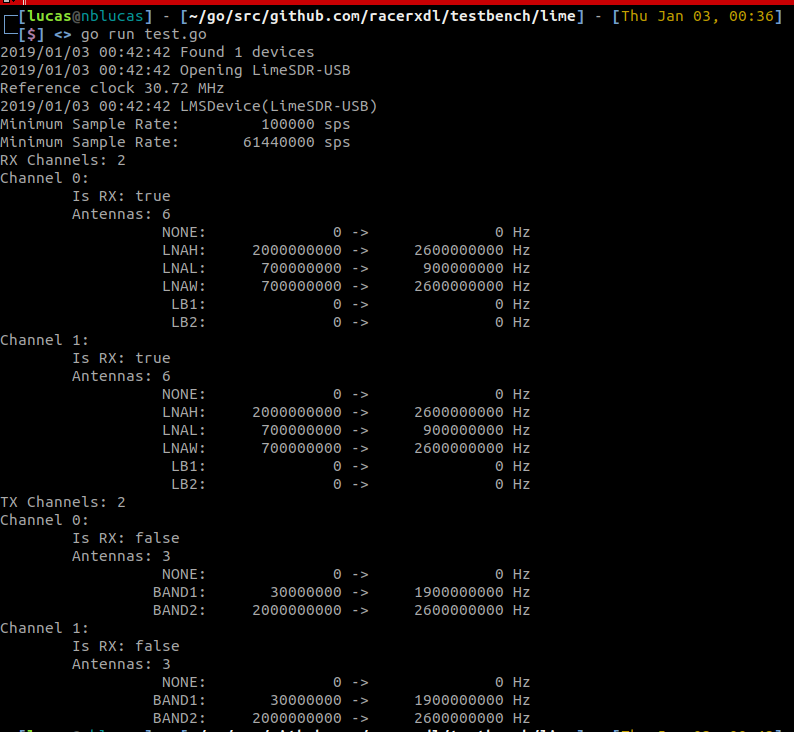Limedrv: Difference between revisions
Jump to navigation
Jump to search
AndrewBack (talk | contribs) (Created page with "''This page is a stub'' {{Community}}") |
LucasTeske (talk | contribs) No edit summary |
||
| Line 1: | Line 1: | ||
== What is Limedrv == | |||
Limedrv is a libLimeSuite Golang wrapper. It is designed to be easy of use and to be very easily integrated with any type of DSP inside go. | |||
== Getting Started == | |||
From now on, this article assumes that you know how to setup your golang environment and can build simple hello world programs. If you don't know or never played with GoLang, please refer to: https://golang.org/doc/install | |||
== Enumerating Devices == | |||
The first thing we need to be able to enumerate all devices that are plugged in. For that, let's create simple program that prints out every lime device that it finds. | |||
<pre> | |||
package main | |||
import ( | |||
"github.com/myriadrf/limedrv" | |||
"log" | |||
) | |||
func main() { | |||
devices := limedrv.GetDevices() | |||
log.Printf("Found %d devices\n", len(devices)) | |||
for i, v := range devices { | |||
log.Printf("%d: %s\n", i, v.DeviceName) | |||
} | |||
} | |||
</pre> | |||
[[File:Limedrv-Sample-0.png]] | |||
Now we can try to open the device and list its capabilities: | |||
<pre> | |||
package main | |||
import ( | |||
"github.com/myriadrf/limedrv" | |||
"log" | |||
) | |||
func main() { | |||
devices := limedrv.GetDevices() | |||
log.Printf("Found %d devices\n", len(devices)) | |||
if len(devices) == 0 { | |||
log.Fatal("No devices found!") | |||
} | |||
d := devices[0] | |||
log.Printf("Opening %s\n", d.DeviceName) | |||
dev := limedrv.Open(d) // Open the selected device | |||
defer dev.Close() // Defer the close of the device | |||
log.Println(dev) | |||
} | |||
</pre> | |||
[[File:Limedrv-deviceopen-print.png]] | |||
{{Community}} | {{Community}} | ||
Revision as of 02:45, 3 January 2019
What is Limedrv
Limedrv is a libLimeSuite Golang wrapper. It is designed to be easy of use and to be very easily integrated with any type of DSP inside go.
Getting Started
From now on, this article assumes that you know how to setup your golang environment and can build simple hello world programs. If you don't know or never played with GoLang, please refer to: https://golang.org/doc/install
Enumerating Devices
The first thing we need to be able to enumerate all devices that are plugged in. For that, let's create simple program that prints out every lime device that it finds.
package main
import (
"github.com/myriadrf/limedrv"
"log"
)
func main() {
devices := limedrv.GetDevices()
log.Printf("Found %d devices\n", len(devices))
for i, v := range devices {
log.Printf("%d: %s\n", i, v.DeviceName)
}
}
Now we can try to open the device and list its capabilities:
package main
import (
"github.com/myriadrf/limedrv"
"log"
)
func main() {
devices := limedrv.GetDevices()
log.Printf("Found %d devices\n", len(devices))
if len(devices) == 0 {
log.Fatal("No devices found!")
}
d := devices[0]
log.Printf("Opening %s\n", d.DeviceName)
dev := limedrv.Open(d) // Open the selected device
defer dev.Close() // Defer the close of the device
log.Println(dev)
}
| |||||||||||||||||||||

